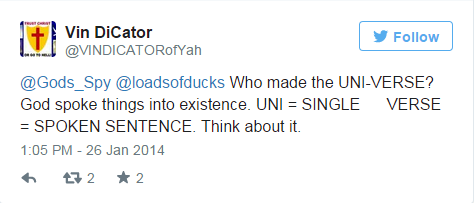by @SuckItEvolution with @TkThtEtymology
There’s a pernicious and annoying little theist meme that’s been spread all over Twitter and other social media channels for several years now. Every so often, you’ll see it getting re-cycled and re-tweeted by new enthusiasts encountering it for the first time. I like to call it “The UNI-VERSE Meme”. It has a number of popular variations, but basically goes something like this (caution: you might want to have a good, stiff drink, before reading further):
“UNI” = One, or single;
“VERSE” = Spoken (or occasionally written) word, phrase,\\ or sentence;
“UNI-VERSE” = A single, spoken word or sentence;
→ Our universe is a “UNI-VERSE” — Created by a single spoken WORD or SENTENCE, uttered by God!
UNI-VERSE meme fans are not quite decided on whether “UNI-VERSE” means a single word, sentence, or phrase (hence, my canonical rendering above). But no matter — they press on undeterred! Often, they’ll embellish the meme with their own creative nuances. Some even seem to suggest that our physical universe IS that single word or phrase, suspended in the aether like some grand Platonic archetype. Here are just a few examples I’ve harvested from Twitter (note: I’ve posted these as simple screen captures, because the embedded tweets were simply taking too long to load):
Yes, wake up:
Oh, I’ve definitely thought about it:
Adam gets it, of course. Too bad nobody else does:
Sometimes, they don’t really bother to elaborate on what their point is. The meme has become so embedded that they simply repeat it without even giving the punchline. Like The Monkey Question, it is a shibboleth of creationist nonsense.
Now, what I find so exasperating about this meme (and I’m sure many of you do, as well) is that it is not based on the actual meaning, or origin, of the term universe, as used by most English speaking people today. Not in the least. Consider, for example, the English Wikipedia page for Universe, which traces this word’s etymology as follows:
The word universe derives from the Old French word univers, which in turn derives from the Latin word universum.[20] The Latin word was used by Cicero and later Latin authors in many of the same senses as the modern English word is used.[21] The Latin word derives from the poetic contraction unvorsum — first used by Lucretius in Book IV (line 262) of his De rerum natura (On the Nature of Things) — which connects un, uni (the combining form of unus, or “one”) with vorsum, versum (a noun made from the perfect passive participle of vertere, meaning “something rotated, rolled, changed”).[21]
When Googling “Universe etymology”, the first result returned to me by Google was a graphical representation of the same (more or less) above definition from Wikipedia. Following that were a number of other sources of definitions, including a link to the Online Etymology Dictionary, which defines universe as:
universe (n.) 1580s, “the whole world, cosmos, the totality of existing things,” from Old French univers (12c.), from Latin universum “all things, everybody, all people, the whole world,” noun use of neuter of adjective universus “all together, all in one, whole, entire, relating to all,” literally “turned into one,” from unus “one” (see one) +versus, past participle of vertere “to turn” (see versus).
And finally, I’d found, fairly high up there in the search results, this exquisite little gem, posted as a query to Yahoo Answers (italics added by me, to emphasize the truly sticky parts):
Atheists and the word universe?
Verse=spoken phrase
Universe=One spoken phrase
As in “Let there be”
4)As with a lot of language-related mysticism I see, in addition to being a completely incorrect meme, the projection that the etymology of the word somehow reveals a secret about what the denoted object or idea truly means is a bizarre non-sequitur. As noted above, very literally, the primitive roots of “universe” would best be translated “turned into one”. It is still equally bizarre to make a claim that this proves that there were once many things that were separated which have now become one. The argument by etymology, with or without a correct etymology, is a case of the Genetic Fallacy.
5)Even if the etymology were correct, the meme would require that the mystical power imbued into the word which reveals the true nature of reality exist only in the languages which share the root for this particular concept with English. The literal etymology (or in some cases, the literal meaning) of the word for “universe” in other languages include such things as “order”, “all worlds”, “world in general”, and “wholly everything”. As I often like to joke, if we imbue the same mystical properties into the Dutch word for universe, “Heelal”, literally “wholly everything”, then we have proven that physical existence is all there is, and thus the word proves that no transcendent god exists, since physical existence is wholly everything.
#checkmateuniverse







I happened to see that the Ministry also figured it out.
LikeLike
In the Beginning, the Word was with God and the Word WAS God. The Word of God is Jesus. One Word, One God, One Universe, One way to eternal life…One SONG…
-John 1:1-5 King James Version (KJV):
1 In the beginning was the Word, and the Word was with God, and the Word was God.
2 The same was in the beginning with God.
3 All things were made by Him; and without Him was not any thing made that was made.
4 In Him was life; and the Life was the Light of men.
5 And the Light shineth in darkness; and the darkness comprehended It not.
-John 1:14 King James Version (KJV)
14 And the Word was made flesh, and dwelt among us, (and we beheld his glory, the glory as of the only begotten of the Father,) full of grace and truth.
-Isaiah 12 King James Version (KJV)
2 Behold, God is my salvation; I will trust, and not be afraid: for the Lord Jehovah is my strength and my song; He also is become my salvation.
-Psalm 118:14 King James Version (KJV)
14 The Lord is my strength and song, and is become my salvation.
Zephaniah 3:17 New International Version (NIV)
17 The Lord your God is with you,
the Mighty Warrior Who saves.
He will take great delight in you;
in His love he will no longer rebuke you,
but will rejoice over you with singing!
ALSO:
https://www.merriam-webster.com/dictionary/verse :
verse noun \ ˈvərs \
Definition of verse (Entry 1 of 2)
1: a line of metrical writing
2a(1): metrical language
(2): metrical writing distinguished from poetry especially by its lower level of intensity
(3): POETRY sense 2
b: POEM
c: a body of metrical writing (as of a period or country)
3: STANZA sense 1
4: one of the short divisions into which a chapter of the Bible is traditionally divided
verse verb
versed; versing
Definition of verse (Entry 2 of 2)
intransitive verb
: to make verse : VERSIFY
transitive verb
1: to tell or celebrate in verse
2: to turn into verse
Synonyms
Example Sentences
Learn More about verse
Synonyms for verse
Synonyms: Noun
lyric, poem, rune, song
Noun
Noun
before the 12th century, in the meaning defined at sense 1
Verb
before the 12th century, in the meaning defined at intransitive sense
History and Etymology for verse
Noun
Middle English vers, fers, in part borrowed from Anglo-French vers, verse in part going back to Old English fers, both borrowed from Latin versus “furrow, measure of land, row, line, LINE OF WRITING, line of metrical writing,”
LikeLike
I learned this faulty etymology from Kent Hovind’s creation science videos in 1999-2000. I don’t know he was the first to perpetuate this, but he taught this before memes and twitter.
LikeLike
These mems are not meant to be “proof”; instead, they are a show of solidarity among believers. Like political yards signs they don’t actually change people’s minds, but they encourage like-minded people.
LikeLike
Yeah…and the word unicycle doesn’t mean one wheel, it means one rotation, so anyone that says that it means a one wheeled bicycle is an idiot. Nor does unitard mean one tard, but …
It is funny that any explanation that connects itself to GOD is automatically discarded as “religious rubbish”.
pretty much any person with an ounce of brain would probably come to the conclusion that universe means exactly what it purports to mean: uni=one, verse=stanza, word, etc.
strange for this word to mean “all of the cosmos and all we know to be in space”
LikeLike
As a Christian, I really enjoyed the clarity and cheekiness to this interesting topic that you have brought. I’m doing some research for a sermon on “Metaverse”.
I decided to break down the words. I even looked at the Hebrew word for “Meta” = “Shes dead”. But I was stumped on the “verse” part. So I started doing some digging and I remembered that old meme that you covered in your article. So I googled and found your article. I would consider myself old-school KJV but I’m also logical lol You made some really good points. Thank you again for the clarity 🙂
LikeLike